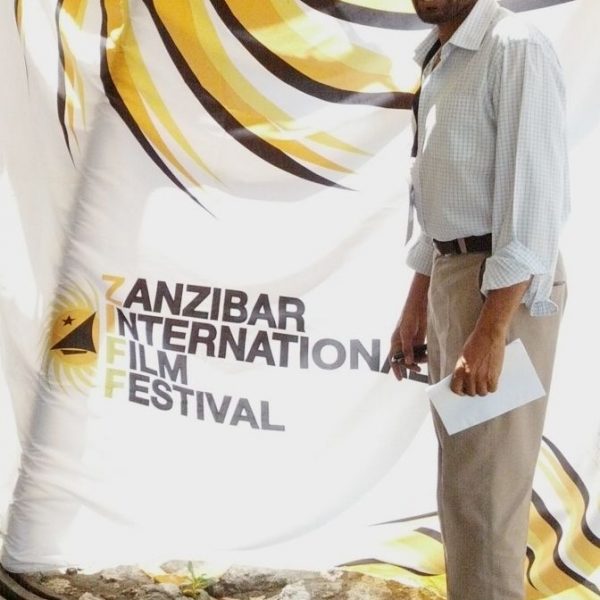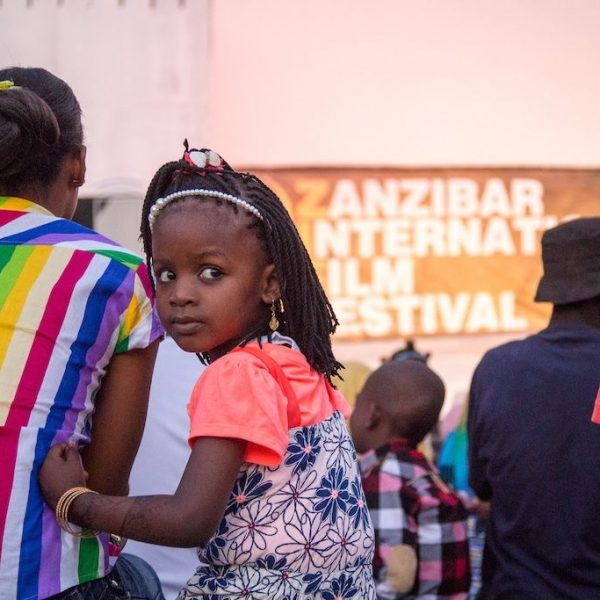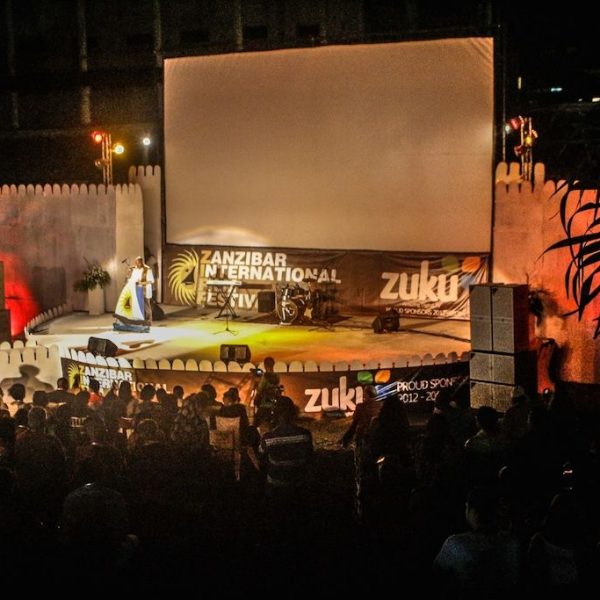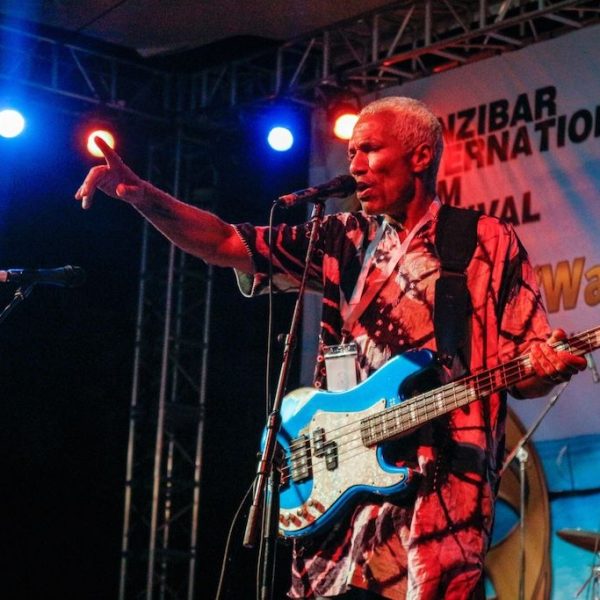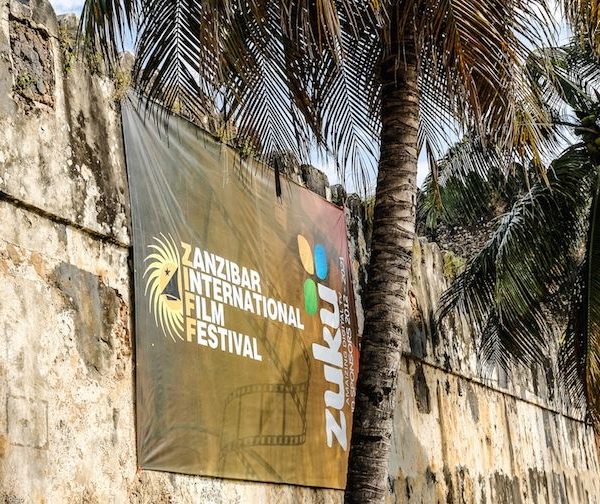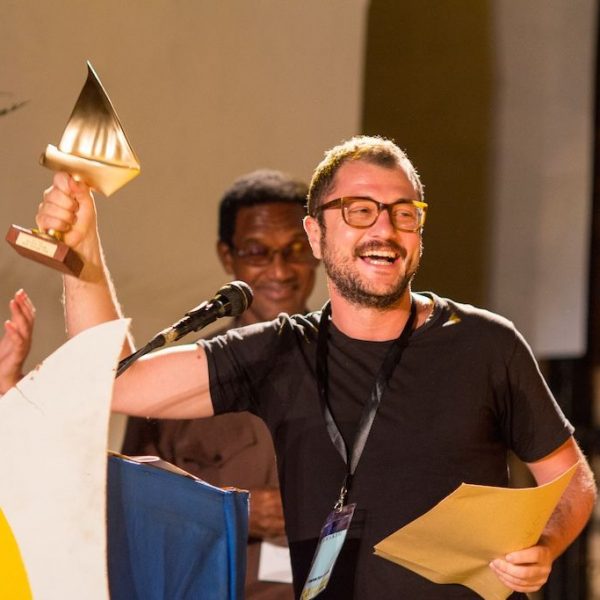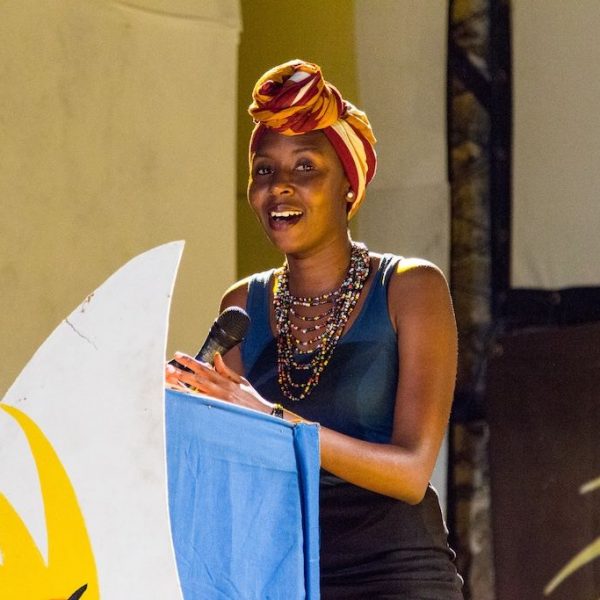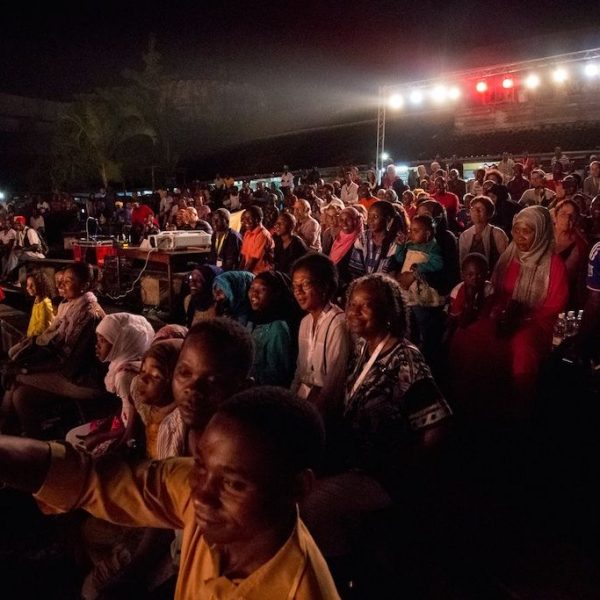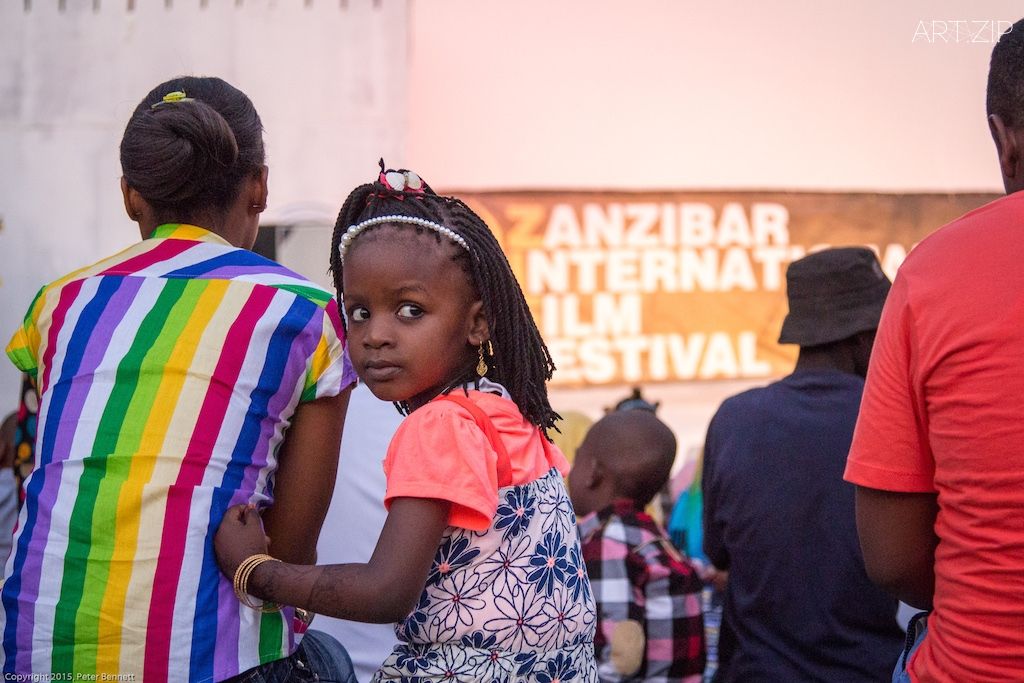
An exclusive interview for Art.Zip with Professor Martin Mhando, CEO of Zanzibar International Film Festival
A shared journey, a shared dream
by Julie O’yang
.
Film is a language, says Martin Mhando, the current curator and CEO of Zanzibar International Film Festival (ZIFF). Because film is about breaking narrative conventions and about diversity.
The Zanzibar International Film Festival (ZIFF) is an annual film festival held in Zanzibar, Tanzania. Being the largest cultural event in East Africa, ZIFF is a non-governmental organization established in 1997 in order to develop and promote film industry as catalyst for the regional social and economic growth. The annual multi-disciplinary cultural event is an all-arts affair, with 8 days of local and international discussion panels, workshops, 10 days of screenings of the best local and international cinema and evenings of musical concerts, including a Gala opening and wrapping-up finale. All festival programmes are to fuse together diverse artistic expressions and forms, offering a wide range of entertainment, educational platforms and networking opportunities for professionals as well as audiences from all over the world. The ZIFF’s unquestionable position as a large multi-disciplinary festival in Africa continues to lead as a tourist attraction event in the region. It is estimated that 7000 tourists from the West came to Zanzibar to attend the festival and the total festival audience in the past years was in excess of 100,000 with wide appeal across race, class and religions. Its impact on the economy of Zanzibar is indisputable.
ZIFF gives 12 International Awards presented by 5 International Juries.
.
。
Uniqueness of Zanzibar
So what kind of a place is Zanzibar?
Martin: “Since the early 20th century, Zanzibar has been an autonomous island loosely joined with mainland Tanzania. Due to its unique geography, Zanzibar has developed a matchless sense of tolerance for multicultural and multiracial civilizations throughout its history. Arabic rule and colonial past aside, the demographic realities of Zanzibar today reflect the cosmopolitan qualities different from, shall we say, the mainstream of African image, which forms an essential part of social life of the Swahili Coast. Like most complex and living things, in fact, Zanzibar refuses to be thrust into neat bags. My home is an extremely lively island immersed in the spirit of Dhow Countries. Like the ancient Silk Road, Dhow is about connecting different peoples and cultures.”
.
Zanzibar, ZIFF, is relevant in today’s globalizing world?
Martin: “A film festival always creates a community around it. If not, it’s the first sign of its failure. What does ZIFF stands for? ZIFF is for people who feel about Zanzibar and its larger context and environment, about African people, especially our women and children. I want ZIFF to be a home for African voices.”
.
Then what? It would be vain for us to believe film can change the world…
Martin: “The world is not flat and films may not be, in the hierarchy of human needs, in the first five categories…Let us give art the place to improve the lives of the world’s poorest…”
Which is why ZIFF films are shown in Stone Town in Zanzibar City as well as rural Zanzibari villages. Martin Mhando loves films! He loves making them and curating them. Associate Professor Martin Mhando is a Research Fellow in the School of Media, Communication and Culture at Murdoch University in Western Australia, as well as being Co-editor of the Journal of African Cinemas, published by Intellect, UK. His first full feature Maangamizi (The Ancient One) is a 2001 American/Tanzanian drama film. Co-directed by Martin Mhando and Ron Mulvihill, the film premiered at the Pan African Film Festival and has played in over 55 Film Festivals worldwide ever since and won various prestigious prizes. The intriguing story tells about Dr. Asira who is faced with the contrast between Western medicine and traditional East African spirituality when a woman, Samehe, who is admitted to a psychiatric hospital, claims to be under the power of Maangamizi, a mysterious ancestor…
I guess it’s safe to say Martin Mhando is a natural optimist. He uses his popularity to connect local people to the silver screen by not being a glamorous star. Sure, he wears a traditional white kanzu under a stylishly cut western jacket plus Italian leather shoes on the opening gala evening – and delivers vivid, firm hand gestures while he talks to me – what makes him and ZIFF a distinguished assembly, though, I believe, is the dynamic strength like a quietly soaring tower that breathes the past, the present and the future.
.
Chairman Mao, soap opera and China
Martin Mhando is China’s old friend.
Martin: “China and Tanzania have enjoyed a long and friendly relationship during the past decades. One notable highpoint is the 1800-kilometer-long Tanzania-to-Zambia Railway, which was built with the help of China. Africa needs and has always needed technology for its development. I think nothing is wrong with that. In many ways, my personal career path has echoed African call for openness for opportunities in both cultural and business aspects. China is ready to provide all that. The close ties between the two countries are rooted in history. My very first visit to your homeland was in the year when Chairman Mao died. In 1986 I went to Beijing and visited China’s capital and paid homage to that giant of ideas. I felt I had a real connection to this place; I even wrote a poem about my first China adventure (laughs). I wrote something like:
Today the sky fell and I along with it
When a large tree falls, its branches reach afar
And I cried along on the death of a fallen giant!
Back then, socialist China was trying hard to re-enter the UN. In 1971, China was finally re-admitted to the UN. Among the African countries that supported this motion, Tanzania played an active role.” Today, the two countries’ still maintain close ties. Of the five East African Community member states, Tanzania continues to attract the most Chinese investment, with 3 billion US dollars flowing into its mining sector in 2011.
.
And you returned to China many times in the years to follow. What brought you back again?
Martin: “It was…soap opera. During the past decades I have visited various Chinese metropolises, such as Beijing, Shanghai, and Guangzhou. More recently, I have been invited by Yunnan Nationalities University to make documentaries of the local subjects and mainly to present the African point of view on China’s multicultural life. In this context, I have worked in the city of Yuxi in China’s southwest province of Yunnan as a filmmaker and guest lecturer at the Yuxi Normal University. I used well-known soap operas to teach my Chinese class of filmmakers about narrative structure and conventions. I must say it was an effective way of communication between me and my Chinese colleagues and students, who didn’t speak English well. In the end, they were keen to participate and were less shy and reserved. So that was my bit in ‘living your life as a soap opera’!”
.
You brought Africa to China. Did you bring China to Africa?
Martin: “It has always been my motivation to work more and more with China and the Chinese subjects. Back in 2008, a Qingdao dance group attended ZIFF and brought Zanzibar an unforgettably spectacular show including acrobatic acts. Introduced for the first time in 1960’s, Chinese acrobatic tradition has taken roots in Tanzania in a very special way. We can easily say that every Tanzanian theatre group today has its past in cultural exchange with China and Chinese acrobatic companies sent to Africa. Chinese acrobats and Kung Fu stars are time-honoured areas of interest, even iconic for China. And noodle making and drying is a familiar scene under the Zanzibari sun! We welcome continued co-operation in these fields, in the meanwhile, we are looking for new challenges. For example, this year we have signed an agreement with Beijing Film Academy to exchange a selection of our ZIFF films to be screened in China. In return, we expect Chinese filmmakers to submit their works either independently or through official channels to enter Africa and reach out to the audience over here! In 2009, ZIFF poster was designed by a a student of the Yuxi Normal University. I just want to emphasize that ZIFF is all about our tradition and past, but ZIFF stands equally for future and for novelty and freshness of new film voices!”
.
When film is a metaphor
For me, art, film is a legitimate tactic to shake up and challenge the intellectually lazy minds. It takes more than money to make a good film. What is Professor Martin Mhando’s next good, important film, if I may?
Martin: “It is secret.” He laughs cunningly, eyeing me as if I had flouted some unwritten rule of professional discretion, adding, “But that’s the title of my next full feature, Ni Kunga, meaning it is secret. It’s a love story. A love triangle, to be precise.”
He pauses; I’m all ears.
“Tanzania, like some other African countries, took the socialist path shortly after obtaining independence in the 1960s. Meanwhile, newly-independent Zambia had a hard time exporting bronze from its mines. China decided to help build the 1800 kilometre-long Tanzania-Zambia Railway in the 1970s so that Zambia could export bronze through Tanzania. This forms the background. Yes, China plays a central role in Ni Kunga. However, few people today know that it was the Americans who wanted to build the railway. So originally, the idea did not come from China at all. After the Nyerere government took a turn to the left, the Americans decided to walk out on the railway project as a warning lecture, before the Chinese stepped in. But it came all at a hefty price. At the time, China was suffering economic difficulties. And during the arduous task of railway building, over 64 Chinese workers paid with their lives. That’s not the focus of my film, though. While China engaged itself in railway building, the US took upon a new project: to build a road parallel to the Chinese railway. And these two long paths only cross each other once at one single point!”
.
This IS a love story laden with metaphors?
“So, in my story, there is this American guy working in the American project and this Chinese guy working in the Chinese project. They both fall in love with a Tanzanian girl. The planned deadline is 2017. I would like very much to co-direct Ni Kunga with a Chinese director. I think bringing two different cultural views in a story is of invaluable importance. It gives extra layers and creates unexpected narrative tension, which I appreciate as a filmmaker. Right now, I’m looking for the perfect match for my project. Making a feature film one has to deal with very mundane, practical things. It’s not sexy from the red-carpet point of view. Film making is about making genuine human connections.”
.
Can I say that ZIFF’s mission is to continue to strengthen already robust relations between China and Tanzania? Who wins in the end in Ni Kunga?
Martin: “It is secret.”
。
.
Art.Zip專訪桑給巴爾國際電影節首席執行官馬丁.曼都教授
共享一次旅程,心存一個夢想
歐陽竹立執筆
.
用馬丁.曼都自己的話來說,電影是一門獨立的語言。馬丁教授是桑給巴爾國際電影節(ZIFF)目前的策展人兼首席執行官。“電影是關於打破現有的敘事規則,關於文化多樣性。”
桑給巴爾國際電影節(下文簡稱ZIFF)是在坦桑尼亞桑給巴爾島舉行的一年一度的大型國際電影節,也是東非最大的文化節。作為非政府組織運作的ZIFF於1997年孕運而生,目的是為發展和促進電影業並以之為催化劑,為社區經濟及社會發展能起到舉足輕重的作用。一年一度的全方位、多學科的文化活動包容了藝術形式的各個方面,其中有8天學術專題討論、工作坊、10天放映來自本地和全世界各國的優選影片,此外還有晚間音樂會、派對以及盛大的紅毯開幕式和閉幕式。每天的節目日程都融合了多樣化的藝術表現形式,為來自全世界的觀眾和專業人士提供廣娛樂、教育平臺和交流機會。ZIFF作為非洲大型多平臺文化藝術節正在繼續引領並帶動該地區的旅遊活動。據估計,來自歐美的遊客大約每年有7000人來參加桑給巴爾電影節,迄今為止,觀眾群總數達到10萬以上,他們跨越種族、階層和宗教。電影節活動對桑給巴爾經濟的影響是不容置疑的。此外,ZIFF的5個國際評委會在電影節期間頒發12項國際大獎。
.
得天獨厚的桑給巴爾島
桑給巴爾島到底是個怎樣的地方呢?
馬丁:“自20世紀初,桑給巴爾島一直是自治的島嶼,同坦桑尼亞大陸地區只存在比較鬆散的關係。由於其獨特的地理環境,桑給巴爾在歷史上對多元文化和多種族的文明都無比寬容。咱們今天就暫且撇開阿拉伯統治和殖民史不談,今天桑給巴爾的人口現實反映了一種國際化的特質,這一特色非常不同於大家所熟知公認的所謂“主流非洲”的形象,這種文化多元化特質卻正是東非斯瓦希裡海岸的社會生活中一個重要組成部分。正如一切複雜的活生生的事物,桑給巴爾島拒絕被歸類。我的家鄉是一個充滿生機、充滿探索精神的地方。正如中國古代的絲綢之路,我們傳統的遠航貿易帆船(Dhow文化)的核心就是連接世界各地不同的民族與文化。”
.
所以說,桑給巴爾島以及您主辦的電影節是順應了當今全球化世界的大趨勢?
馬丁:“創辦一個電影節的同時也是在創建一個社區,如果做不到這一點,這就是失敗的第一個跡象。ZIFF電影節代表什麼? ZIFF是獻給對桑給巴爾島有特殊感情的那群人,但它卻函括了更深廣的文化背景及文化上下文,函括了非洲大陸的人民,尤其是我們的婦女和兒童。我想把ZIFF成為來自非洲的聲音的一個家。”
.
您相信電影可以改變世界、改善這裡人們的生活嗎?
馬丁:“ 世界不是電影屏幕,世界不是平的,電影可能不會是人類基本需求的頭五類之一。但是讓我們堅持這個信念,藝術能夠改善世界上最貧窮的人們的生活!”
也許這就是為什麼ZIFF影片除了在石頭城(Stone Town)外,也在桑給巴爾島上很多邊遠村莊放映的原因。馬丁.曼都熱愛電影!他熱愛拍電影,也熱愛策展電影。馬丁.曼都教授是西澳大利亞莫道克大學傳媒文化學院的高級研究員,他也聯合主編由英國出版的《非洲電影專刊》。他的第一部故事片Maangamizi(《祖先之魂》)由美國與坦桑尼亞合拍,2001年出品。該片在泛非電影節上首映後連續在全球55個電影節放映,並獲得各種重要獎項。耐人尋味的故事講述的是Asira大夫面對西醫與傳統東非醫術之間衝突這個挑戰,當一位叫Samehe的女人被送進精神病院,而她聲稱自己是身上有一名神秘的祖先的靈魂附體……
馬丁.曼都是天生的樂觀主義者,他利用自己的聲望來提高電影藝術在當地的影響力,他並沒有明星的造作。儘管在紅毯開幕式上他西服革履,再搭配上傳統的白色長衫,風度翩翩,令人油然而生敬畏,但ZIFF最不同凡響的地方是它的張力,這讓我想起一座在靜默中飆升的高塔,它俯瞰著腳下世界的過去、現在和未來。
.
肥皂劇與中國的關係
馬丁.曼都是中國的老朋友。
馬丁:“中國和坦桑尼亞在過去幾十年裏有著長期的友好合作關係,由中國援助修建的1800公裏的坦贊鐵路就是最有力的證據。非洲一直很需要技術方面的支持來尋求我們自身的發展,我覺得這並沒有什麼不妥。我個人的職業生涯可以說在很多方面也是響應了非洲開放門戶的呼喚,其中包括文化交流及商務交流的雙贏共惠。中國能提供給非洲這一切。中坦兩國之間的密切關係是紮根歷史的。我第一次去中國是在1986年,毛澤東主席去世的同一年,我去北京參觀並也瞻仰了毛澤東這位思想巨人。我覺得自己對中國一見鐘情,我甚至寫了一首詩紀念自己第一次中國歷險記(笑)。當時的社會主義中國在力圖重新進入聯合國, 1971年中國終於重新進入聯合國,坦桑尼亞在此發揮了積極作用。”事實上兩國至今仍然保持著密切的聯繫,在五個東非共同體成員國中,坦桑尼亞繼續在吸引著最大的中國投資,僅2011年,30億美元投入到了當地的採礦業。
.
您之後曾多次返回中國,原因何在?
馬丁:“原因就是……肥皂劇。在過去幾十年裡我曾經訪問過中國各個大城市,例如北京、上海和廣州。近年來我接受了雲南民族大學的邀請去拍紀錄片,主要是以非洲人的視角來看中國的多元文化生活。我在中國西南省份的玉溪市工作過,我既是導演又是玉溪師範大學的客座講師,我用眾所周知的肥皂劇來向課堂裏的中國學生解說敘事結構與敘事常規,我的中國同事和學生英語都比較生疏,這個辦法卻很有效,最終,他們都熱衷於參與到熱烈的討論中,克服了他們的害羞。我現在可以吹噓自己也曾經肥皂劇過一把!”
.
您把非洲帶到了中國。您也把中國帶回非洲嗎?
馬丁:“我一直就很想越來越多與中國合作或者打造與中國有關的主題的影片。早在2008年,青島市一個舞蹈團就來參加ZIFF,給桑給巴爾帶來一場難忘的壯觀的表演,其中包括雜技表演。中國雜技在上世紀60年代進入坦桑尼亞後,已在我國紮根並開花結果。我們甚至可以說,坦桑尼亞目前的所有的劇團都同當年中國派往非洲的雜技交流團隊密切相關。中國雜技和功夫明星們是大家熟悉的話題,也是富有標誌性的中國形象。在桑給巴爾島上生活的人們甚至知道怎樣曬麵條!我們非常歡迎在這些領域裏與中國繼續合作,與此同時,我們也在尋找新的挑戰和新的機會。例如,今年我們與北京電影學院的簽署了一項協議,交換ZIFF的部分影片,拿到中國放映。我們同時也希望中國電影人以獨立身份或正式渠道提交他們的作品,來參加電影節,進入非洲,走向當地的觀眾! 此外,2009年ZIFF海報是由一位中國傳統木刻藝術家設計的。我只想強調的是,ZIFF代表著豐厚的傳統,ZIFF也面對未來,擁抱來自中國的新人、新作品、新電影!”
.
電影更是一個隱喻
對我來說,藝術也好,電影也好,都是在挑戰習慣性思維的正當手段。一部電影大作只是用錢是做不到的。冒昧地請問一下馬丁.曼都教授,下一部大作是什麼?
馬丁:“這是秘密。” 他狡猾地笑著說,故意裝出責備的表情看著我上,然後補充道,“Ni Kunga是我的下一部故事片,意思是“這是秘密”。這是一部愛情片。更準確說,講的是三角戀。”
他停頓一下,我耳朵立刻豎了起來。
馬丁接著說:“ 坦桑尼亞獲得了獨立後,於20世紀60年代後不久走上了社會主義道路。當時,新獨立的贊比亞有青銅礦,於是在上世紀70年代,中國決定幫助修建一條長達1800公裏的坦贊鐵路,贊比亞可以通過坦桑尼亞出口青銅資源。這就是電影故事情節的歷史背景。是的,中國在Ni Kunga中的角色舉足輕重。然而,今天很少有人知道最初想修鐵路的是美國人,中國當時並沒有這個想法。之後呢,尼雷爾政府向左轉,走社會主義,美國人決定放棄鐵路項目來警告坦桑尼亞政府,中國此時決定介入鐵路修建項目。鐵路給中國來了沈重的代價,因為當時的中國正遭受經濟困難,鐵路建設的艱鉅任務中64名中國工人付出了自己的生命。這些細節並不是我的電影的焦點。我的電影講述的是在中國進行鐵路建設的同時,美國開展了一個新項目:修公路,而美國公路與中國鐵路是走的平行線,兩條漫長的路只在一個單點交叉過一次!”
.
這確實是一個充滿了隱喻愛情故事,對嗎?
“在我的故事中有位修公路的美國小夥,有位修鐵路的中國小夥,他們兩人都同時愛上了一位坦桑尼亞女孩。我計劃這部電影在2017年拍完。我很想找到一位中國導演合作,共同執導這部作品。我認為把兩種不同的文化觀念引入到同一個故事相當重要的,它增加故事的層次感,並能夠發展出意想不到的敘事張力,作為的電影人及導演的我非常讚賞這樣的視角。我目前正在尋找一位完美的中國搭檔。製作一部電影的日常工作很瑣碎很實際,並不是人們想象中那樣的輝煌而性感的紅毯時刻。電影製作的目的是使人類之間能夠達到真正的交流與溝通。”
.
ZIFF的使命是繼續加強中國與坦桑尼亞之間已經非常強大的連係。我的最後一個問題是:Ni Kunga結局中最終是誰贏得那位坦桑尼亞女孩兒的心?
馬丁:“這是秘密。”

